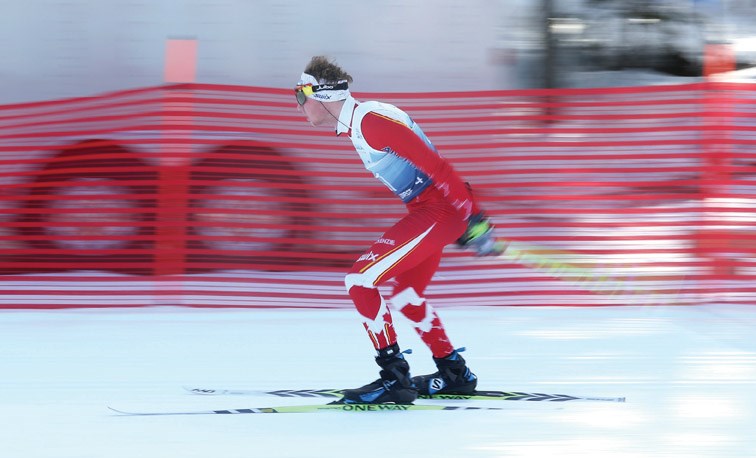Fans who turned out at Otway Nordic Centre over the weekend to watch the World Para Nordic Skiing Championships were probably wondering where Brian McKeever was.
The 39-year-old visually-impaired skier from Canmore, a 13-time Paralympic champion and winner of 19 world championship gold medals, missed Sunday's mid-distance race and was not on the entry list for Monday's sprints.
McKeever is half a world away in Monacco, where he's attending the Laureus World Sports Award banquet. His three-gold, one-bronze performance in the 2018 Paralympics in Pyongchang, South Korea, led to his nomination for the award in the athletes-with-a-disability category.
Oksana Masters of the U.S. is also nominated but skipped Monday's ceremony to come to Prince George for the duration of the world championships. The other nominees are German long-jumper Markus Rehm, Greek bocchia player Grigorios Polychronidis, Dutch wheelchair tennis player Diede deGroot and Slovakian skier Henrieta Farkasova.
McKeever is expected to race in Saturday's team relays and the 20-kilometre cross-country race Sunday.
Bachinsky makes his mark
Jesse Bachinsky made it though Sunday's 10-kilometre visually-impaired men's cross-country race unscathed, but not his ski poles. With half a lap left in his race, some faster skiers in the men's standing category were passing him on either side when he got his poles stuck and snapped both of them. He finished the race but ended up last in a field of 15.
"I just tried to stay focused and pick up the pace and do my best," said Bachinsky, a 20-year-old from Kenora, Ont.
His guide, Simon Lamarche of Victoria, handed him a pole but he still had the strap of the broken one attached to one of his hands, which slowed his progress. Despite his partner's mishap, Lamarche was impressed with Bachinsky's progress Sunday. He had a slow start to his season on the Alberta Cup circuit but performed well enough in his first World Cup two months ago in Finland to crack the Canadian squad for the world finals.
"He really improved today - the end of the race was a bit tough for us but 3 1/2 laps were awesome and I'm really proud of him because he pushed really hard today," said Lamarche.
Bachinsky is a B2-class racer and can see shadows on clear days but in snowy or foggy conditions he has no vision and his condition is worsening. The two wear headsets to communicate with each other on the course and Bachinsky responds to Lamarche's voice commands. They'd already skied the course at least 100 times before Sunday's race and Bachinsky is familiar with the terrain but depends on his partner's voice to tell him when they're approaching hills and corners or other skiers.
The entire course is designated a "holding zone," which means Bachinsky is allowed to hold on to Lamarche's pole, especially on steep downhill sections, but he's not allowed to pull Bachinsky up hills.
"Basically I rely on having really good balance and what I hear (from Lamarche) and I navigate just be feel," said Bachinsky. "It's hard to really judge how fast you go, you just keep going fast and try not to slow down. This is a really fast course and that's where you make up your speed on the downhills to carry you over the hills."
"The conditions are really great, it's fantastic racing with these guys, you gain experience every time and we have an amazing and supportive group," he said.
On Monday, Bachinsky competed in the cross-country sprint event. He placed 11th in the first qualification race, however, and did not advance to the semifinals.
Later, in the final, Zebastian Modin of Sweden claimed the gold medal. He placed ahead of silver-medalist Yury Holub of Belarus and bronze-medal-winner Dmytro Suiarko of Ukraine.
Coach's critique
Following on the heels of a 16-medal performance at the 2018 Paralympics, expectations are running high in the Team Canada camp. After the first two days of racing, standing skier Mark Arendz, a six-time Paralympic medalist in 2018, was two-for-two with cross-country silver and biathlon bronze to add to Canada's medal count, while sit skier Collin Cameron earned a silver medal in Saturday's biathlon. On top of that there were some near-podium misses on the weekend. Standing skier Brittany Hudac was fourth in her biathlon race, Natalie Wilkie was fourth in her standing cross-country race and sit-skier Derek Zaplotinsky was a fifth-place finisher in his cross-country race Sunday.
As one of the perennial leaders on the para nordic world scene, Canada's crew knows their own past performances set the bar high to rise to the occasion racing on home soil.
"I do love the start to the championships but it's also, sadly, expected," said coach Robin McKeever. "The pressure's on, right, and we're at home here so it makes it additional pressure. We're just focusing on skiing the way they can, that's the biggest key and I'm happy with that start to the week."
Cameron is Canada's top sprinter and, despite being sick in bed Sunday, added to that biathlon silver medal when he earned his country a gold in Monday's cross-country sprint event.
Chill's out
It appears the worst is behind the competitors, weather-wise. Bone-chilling cold and wind chills that delayed practice sessions and made life difficult for course workers last week are giving way to closer-to-normal weather conditions. The high on Tuesday was -5 C, with some morning and evening snow.
Tuesday was a rest day and, when racing resumes today at the championships, highs are expected to reach of -3 C .
On Thursday and Friday, high temperatures are predicted to be -4 C and -1 C respectively.



